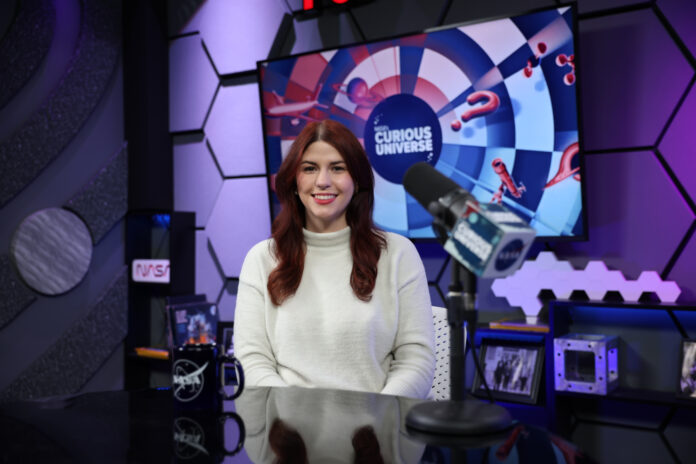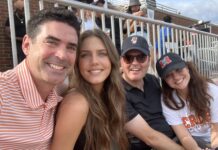
A Mercer University alumna has been named to the Forbes 30 Under 30 in Media list for her innovative work crafting NASA’s audio storytelling strategy.
Katie (Atkinson) Konans, who graduated from Mercer in 2019 with a Bachelor of Arts in journalism, was recognized in her role as the audio storytelling lead at NASA. In less than five years, she built an audio storytelling strategy that brings educational and inspirational stories from the space agency to millions of podcast listeners.
“Not only is my job super fun and engaging, but I also feel that it makes an impact,” she said. “Because I am focused on communicating NASA’s science and space storytelling, I’m able to reach and connect with individuals, and that’s the most meaningful thing.”
Konans began working at NASA as an intern in summer 2018 and continued to freelance for the space agency during her senior year. She joined NASA full time in 2019 at the Goddard Space Flight Center in Greenbelt, Maryland.
As an intern, Konans’s job was to experiment with audio storytelling. She started producing short-form audio projects that were built with sounds from around NASA and provided expert commentary.
In the three-minute “Sounds of the Sun” audio project, the listener hears the vibration of the sun while a NASA heliophysicist explains the sound.
“That piece took off, and I think that kind of showed NASA that there is a level of interest in audio storytelling,” Konans said. “From that point on, I was able to fully build up contributions over time.”
In late 2019, Konans was invited to be part of a group tasked with envisioning what the future of NASA audio would look and sound like.
“When I started, there were a lot of podcasts at NASA. There just wasn’t a strategy,” she said. “At one time, we had over 40 different podcast offerings, and they weren’t performing well.
“Over the last several years I’ve been able to shape and build NASA’s audio program where now we have five actively releasing shows that are all strategic, tailored to unique audiences, and they enhance our digital communication strategy overall.”
Konans launched the space agency’s flagship podcast, “NASA’s Curious Universe,” in 2020. It’s now in its sixth season.
“‘NASA’s Curious Universe’ was designed to answer that question of, ‘What does NASA sound like?’” Konans said. “Each episode is designed to bring podcast listeners on an adventure with a NASA expert. … We’re really focused on offering podcast episodes that only NASA can bring to listeners, so we do that through leveraging our unique access to experts, unique locations and scientific results.”
Winnowing down 40 podcasts to five strategic ones was a challenge.
“Especially being a younger woman stepping into an agency like NASA, it can be very daunting to share your ideas or to share a new strategic direction,” Konans said. “I think at times there certainly was resistance, but I’m really committed to taking a data-informed approach, and I think my colleagues at NASA feel the same way. So being able to show why a storytelling direction wasn’t effective, that was really key to winning over support and making allies not enemies.”
Konans has received the NASA Early Career Achievement Medal, a Webby Award, and the Robert H. Goddard Award for her team’s contributions to NASA’s public engagement and communication.
She credited her education at Mercer and the Reg Murphy Center for Collaborative Journalism, as well as an internship at Georgia Public Broadcasting, for her success.
“Working in the teaching hospital model of the (Murphy Center) really set me up for success,” she said. “By the time I started as a NASA intern, I already had several internships in the media workplace that I think really primed me to be able to succeed at NASA.
“There are a lot of things that we studied at the (Murphy Center). Audience engagement is a really crucial element of storytelling, building communities. When I reflect on my time at Mercer and think about my role today, I find myself using those skills every day. It’s not just about attracting an audience but really having meaningful engagement with them and sustaining that community.”
Konans was appointed to Mercer’s National Journalism Advisory Board in 2022 and continues to mentor students who are interested in audio storytelling.









